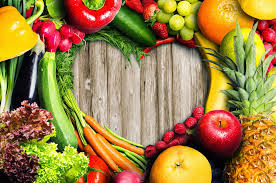Advertisements
Growing concerns about health and the environment have driven a true revolution in the way we choose our food. Organic products, grown without the use of synthetic pesticides and chemical fertilizers, have been gaining space on the shelves and plates of those seeking a healthier and more sustainable life. In this context, understanding the advantages of organic foods is essential for those who want to make conscious and impactful choices for their own well-being and for the planet.
Organic nutrition goes beyond what’s on your plate; it’s a commitment to farming practices that respect the earth’s natural cycle. By choosing foods free from artificial chemicals, you can ensure a diet rich in nutrients, flavor, and authenticity. This article explores the nutritional benefits of organic food, highlighting how it can contribute to a more balanced and healthy diet, and discusses the differences between organic and conventional products.
Advertisements
Sustainability is another fundamental pillar when it comes to organic food. This type of production seeks to minimize environmental impact, promoting biodiversity and soil health. Understand how organic farming can be an ally in the fight against climate change and in the preservation of natural resources, encouraging practices that protect local fauna and flora.
Choosing organic products represents more than just a consumer trend; it is a step towards a more conscious and responsible lifestyle. By delving into this universe, this text offers valuable information for those who want to transform their eating habits into an act of self-care and the environment. 🌱
Advertisements

What are organic foods?
Organic food is an agricultural product that is grown and processed without the use of synthetic pesticides, chemical fertilizers, genetically modified organisms (GMOs) or ionizing radiation. The main focus of organic production is to work in harmony with nature, promoting practices that support the health of soil, ecosystems and people. This means respecting biodiversity and natural cycles, without resorting to techniques that could be harmful in the long term.
In addition to fruits and vegetables, organic production includes meat, dairy and eggs, where animals are raised without growth hormones, routine antibiotics and in conditions that respect their welfare. In the world of processed foods, products labeled organic must contain mostly organic ingredients, without the inclusion of artificial additives or preservatives.
Health benefits of organic food
More nutrients for your body
Studies have shown that organic foods may contain higher levels of certain nutrients compared to their conventional counterparts. This is due in part to the absence of synthetic pesticides and fertilizers, which can inhibit the production of beneficial compounds such as antioxidants. Organic fruits and vegetables, for example, are often higher in vitamin C and antioxidants, which are essential for fighting free radicals and protecting the body against chronic diseases.
Additionally, organic meat tends to have a more balanced fatty acid composition, with a higher proportion of omega-3 fatty acids, which are known to benefit cardiovascular and brain health. By consuming organic foods, you’re not only nourishing your body with high-quality ingredients, but you’re also minimizing exposure to chemical residues that can have adverse long-term effects.
Reducing exposure to toxic substances
Choosing organic foods can significantly reduce your exposure to potentially toxic chemicals found in pesticides and chemical fertilizers. Research suggests that pesticide residues, even in low concentrations, can be linked to a range of health problems, including hormonal disruptions, neurological problems, and an increased risk of certain types of cancer. By choosing organic products, you are protecting yourself and your family from these risks.
Food safety is a growing concern, and many consumers are looking to organic products as a way to ensure their food is free of unwanted residues. For those with chemical sensitivities or specific health conditions, such as allergies or food intolerances, organic foods can be an even more vital choice. 🌿
Positive environmental impact of organic food
Preservation of biodiversity
Organic farming plays a crucial role in preserving biodiversity. By avoiding the use of pesticides and chemical fertilizers, organic practices promote a more hospitable environment for local fauna and flora. This means that beneficial insects, such as bees and ladybugs, are more likely to thrive, contributing to a more balanced ecosystem. Crop rotation, a cornerstone of organic farming, also helps maintain soil health and plant species diversity.
Additionally, organic farming tends to use more resilient and locally adapted plant varieties rather than genetically modified seeds. This not only contributes to the genetic diversity of crops, but also makes agricultural systems more resilient to climate change and pests. By supporting biodiversity, organic farming helps protect the planet for future generations.
Reducing pollution and conserving natural resources
One of the main environmental benefits of organic food is reduced pollution. By eliminating the use of synthetic chemicals, organic farming reduces the contamination of rivers and groundwater. Water is a vital resource, and its preservation is essential for life on the planet. Organic practices also promote the responsible and efficient use of water, helping to conserve this precious resource.
Additionally, organic farming contributes to soil health by increasing its fertility and water retention capacity. Techniques such as composting, no-till farming, and the use of mulch are common in organic farming, helping to prevent erosion and promote a natural nutrient cycle. This sustainable approach to food production is essential to mitigating the effects of climate change and ensuring a healthier future for our planet. 🌍
Choosing organic food: practical tips
How to identify organic foods in the market
Identifying organic foods in the market may seem challenging at first glance, but a few simple steps can help. First, look for organic certification seals, which guarantee that the product meets the standards established for organic production. In Brazil, the seal from the Brazilian Organic Conformity Assessment System (SisOrg) is a reliable reference.
Another tip is to opt for seasonal and local foods, which are more likely to be organically grown. Farmers markets are a great place to find fresh, organic produce, where you can talk directly to the farmers about their farming practices. This not only ensures the quality of what you’re buying, but also strengthens the local economy.
Prioritize certain foods when buying organic
While eating organic foods is beneficial, it is not always possible or practical to adopt an organic diet due to cost and availability issues. One strategic approach is to prioritize purchasing certain foods that are more susceptible to pesticide contamination when grown conventionally. These include:
- Apples
- Strawberry
- Spinach
- Tomatoes
- Peppers
These foods are among the most commonly found to contain pesticide residues, and are therefore good choices for buying organic. By making these choices, you maximize the health benefits, even if you can’t adopt an entirely organic diet.
Conclusion
Organic foods play a vital role in promoting healthy living and a sustainable environment. First, it is essential to understand that choosing organic products not only benefits human health, but also supports agricultural practices that respect the planet. Through farming methods that avoid the use of synthetic pesticides and fertilizers, organic foods preserve biodiversity and soil quality. In addition, studies indicate that these foods are often richer in nutrients, providing essential vitamins and antioxidants for the body. Second, organic production contributes to reducing the carbon footprint, as it promotes practices that minimize soil erosion and conserve water resources. The growing demand for organic foods encourages farmers to adopt more environmentally friendly methods, creating a virtuous cycle of sustainability. Finally, choosing organic is a conscious choice that supports the local economy, strengthens farming communities, and promotes social justice. In short, by choosing organic foods, you are not only investing in your health, but also supporting a greener and more sustainable future for the planet. 🍃 So when planning your next purchases, consider the significant difference this choice can make.




